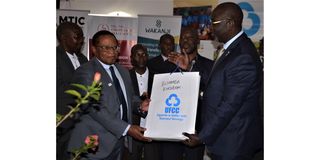Prime
Prof Suruma urges cooperatives to advocate for revival of Cooperative Bank

Prof Ezra Suruma presents a hamper to Mr Robert Kaggwa Nsibirwa, the Second Deputy Prime Minister (Katikkiro) of Buganda Kingdom, during the Cooperatives Symposium held in Masaka on July 20, 2024, with other participants looking on. PHOTO | JANE NAFULA
What you need to know:
- Prof Suruma observed the distressing trend of businesses having their properties sold off by banks, sometimes intentionally making it difficult for them to repay debts just to acquire their assets.
Former Finance Minister, Prof Ezra Suruma, has called upon cooperatives to spearhead efforts for the revival of the Uganda National Cooperative Bank, aiming to make capital more accessible and affordable.
Delivering a keynote address on cooperative banking models on Saturday at the National Cooperatives Symposium held in Masaka ahead of International Cooperatives Day, Prof Suruma criticised the oligopoly prevalent in Uganda’s financial sector since colonial times, which he believes has disadvantaged the country's business community.
Expressing concern, Suruma highlighted that currently, only three out of the 23 commercial banks in Uganda are locally owned, underscoring the need for more indigenous financial institutions to enhance service delivery. He identified Centenary Bank, Housing Finance, and Post Bank as the locally owned banks in the country.
"In 2006, during my tenure as Finance Minister, I visited China and discussed with the Finance Minister there. When I mentioned that 80 percent of banks in Uganda are owned and operated by foreigners, he remarked, 'They are controlling your economic blood. Do not allow foreigners to control your economic blood, otherwise you will be at their mercy," Prof Suruma said.
He added, “Let no one tell you that Ugandans cannot manage a people's bank. We have to find a way to win this struggle. One who controls the bank, controls your access."
Prof Suruma observed the distressing trend of businesses having their properties sold off by banks, sometimes intentionally making it difficult for them to repay debts just to acquire their assets.
He noted that the now-defunct cooperative bank was once substantial, holding half of the total deposits in the banking system before the National Resistance Movement (NRM) took power in 1986. Originally established in the 1960s under the Cooperatives Act, it was later transformed into a limited company under the Companies Act, but in 1999, the Bank of Uganda ordered its closure due to alleged insolvency.
Prof Suruma also challenged local financial institutions to address issues of mismanagement and fraud if they are to flourish.
Gen Wilson Mbadi, the State Minister for Trade, Industry, and Cooperatives, announced the formation of a seven-member committee comprising cooperative leaders and representatives from top SACCOs to oversee the revival process of the Uganda National Cooperative Bank.
Mr Andrew Kyepa, CEO of the Uganda Federation of Community Credit Cooperatives (UFCC), emphasized the importance of grassroots development discussions, where the majority of people reside.
State Minister for Cooperatives, Mr Fredrick Ngobi Gume, assured government support for the cooperative movement to boost Ugandan production and productivity.
Dr Sifa Kassim, Deputy Director-General of Agriculture Technology Production at the National Agricultural Research Organisation (NARO), urged cooperatives to embrace value addition and support the Buy Uganda, Build Uganda (BUBU) initiative.
Mr Robert Kaggwa Nsibirwa, the Second Deputy Prime Minister (Katikkiro) for Buganda Kingdom, stressed the need for sustainability and inclusivity for a prosperous future for the community and nation.




